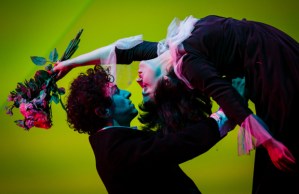Review: Tristan and Yseult (Theatre Royal, Brighton Festival)
Kneehigh’s classic tale begins its latest tour as part of the Brighton Festival
‘The loved attract love,’ reasons Whitehands, the mysterious wronged woman in white '50s couture who circles this production unseen. 'If you’re already loved, then more love seems to come your way'.
Kneehigh’s version of the world’s oldest love story attracts love by the theatre-load. First staged in 2003, and now in its fourth incarnation, Tristan and Yseult is the most successful show in the hugely popular company’s 37-year history. Five star reviews are standard issue. Adapter and director Emma Rice, now of Shakespeare’s Globe, describes it as 'my compass and my guide'. A new Celtic tour has begun this week as part of the Brighton Festival, where shouts of laughter, bursts of applause and a gleeful interval vibe suggest yet another audience is falling hard.
But I'll just have to put on a 'joyless b***ard' badge and admit that, try as I might, I couldn't get on board. While Kneehigh’s madcap production spins itself and its audience giddy, I sat unmoved. My sympathies were less with the intoxicated lovers cavorting centre stage, and more with the chorus of birdwatchers who scrutinise the action through binoculars, desperate to experience what everyone else is experiencing.
These tank-topped geeks are The Unloved. As musicians and comic stagehands, their presence reframes the epic love story of Wagnerian legend from the perspective of those whom such grand passion excludes. Unlike the narrator, Whitehands – whose surprise identity lends the story its concluding twist – they aren’t bitter. They sail model ships to unite the lovers, play an arduous game of charades (while dressed as forest shrubbery) to warn them of danger, and accompany almost every breath of their story with song, from a live version of Daft Punk’s "Get Lucky" to a vinyl-play of Nick Cave’s "Sweetheart Come". There are Irish jigs, mambo breaks, passages of Wagner and a version of the drone-haunted Irish traditional "My Lagan Love" along the way.
The story is cut from the same Cornish cliffs as the company. Tristan, here played by Dominic Marsh as a smoulderingly suave and fiercely melancholic Frenchman, pledges to find the owner of a strand of red-gold hair and bring her to marry the King of Cornwall. He duly locates Irish princess Yseult (played with elfin beauty but not a great deal else by Hannah Vassallo). But the two drink a love potion, and are soon having lots of dance-sex while Yseult’s handmaid Brangian (a dragged-up Niall Ashdown) tries in vain to peel them apart.
Three scenes do work some of the Kneehigh magic on us. After swigging from two identical bottles, one of love potion and one of wine, Tristan and Yseult are lifted head over heels in an aerial choreography that suggests the dizzying power of lust. Tristan’s jaded best man’s speech is a treat of inappropriateness: in his shirtless suit, handsomely accessorised with shades and bandaged wound, he remembers the horrors of war and the pleasures of lust. ('What was that?' squeals King Mark’s frill-shirted aide-de-camp in consternation. 'Go lie down, you’re scaring the bridesmaids.') Brangian, despite the drag, gets an unexpectedly serious moment of sexual awakening. Deflowered by the King in her Lady’s place, she is shaken, but also stirred.
But Tristan and Yseult feels less than the sum of its multitudinous stylistic parts, and the insistent kookiness more fun to be part of than to watch. So much happens at surface level that there is no time for any of it to sink in. Clunky verse speaking ensures the salt poetry of Cornwall, and lines like 'this knife can part flesh like a lover’s tongue', simply fly by with the rest. The direction seems more concerned with making things happen on stage than in our hearts.
This show might play very differently in its original outdoor context. But on this occasion I was left feeling as though someone had switched my bottle: everyone else got the love potion, and I got the dodgy wine.
Tristan and Yseult runs at Theatre Royal Brighton until 27 May and then tours to Citizen’s Theatre Glasgow (30 May to 3 June), The Minack Theatre (5 to 9 June), Shakespeare’s Globe, London (13 to 24 June), Theatr Clwyd (27 June 1 July), Bristol Old Vic (4 to 15 July), Galway International Arts Festival (18 to 22 July).













